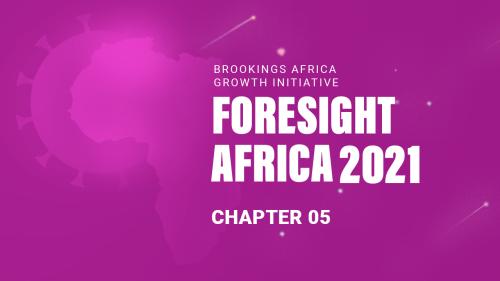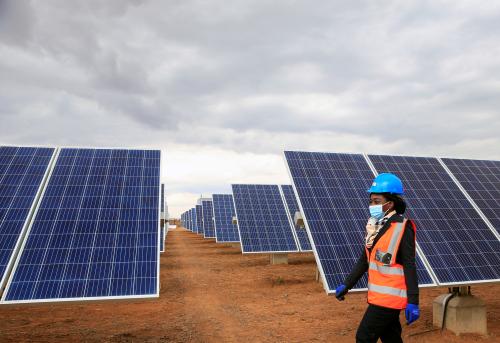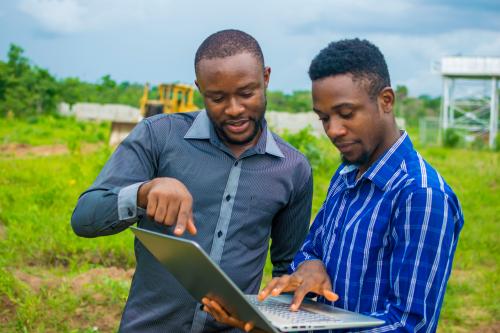Below is a Viewpoint from Chapter 5 of the Foresight Africa 2021 report, which explores top priorities for the region in the coming year. This year’s issue focuses on strategies for Africa to confront the twin health and economic crises created by the COVID-19 pandemic and emerge stronger than ever. Read the full chapter on continental integration.
 Recent progress towards economic integration, starting with such regional blocs and culminating in the landmark African Continental Free Trade Area Agreement (AfCFTA), offers much promise for shared growth across the continent. Unfortunately, the COVID-19 pandemic—which has created production shutdowns, supply chain disruptions, and a profound decline in demand for economic services (notably transport, tourism, and retail) and commodities—has dampened what was an attractive growth trajectory for many African countries and delayed the ultimate implementation of the AfCFTA. These sharp setbacks, though, are likely temporary as the build-back-better agenda gets traction. Already, public development banks, investors, and donors are coming together to drive more financing and investment in the region, through co-financing and risk sharing.
Recent progress towards economic integration, starting with such regional blocs and culminating in the landmark African Continental Free Trade Area Agreement (AfCFTA), offers much promise for shared growth across the continent. Unfortunately, the COVID-19 pandemic—which has created production shutdowns, supply chain disruptions, and a profound decline in demand for economic services (notably transport, tourism, and retail) and commodities—has dampened what was an attractive growth trajectory for many African countries and delayed the ultimate implementation of the AfCFTA. These sharp setbacks, though, are likely temporary as the build-back-better agenda gets traction. Already, public development banks, investors, and donors are coming together to drive more financing and investment in the region, through co-financing and risk sharing.
Given the twin demand-supply shock African economies are experiencing, the region’s build-back-better agenda must address both sides of the issue. In particular, increased attention to trade facilitation—various measures to improved information on the classification and movement of goods between exporters and importers as well as payment mechanisms, and the simplification, standardization, and harmonization of procedures in the movement of goods—as a major enabler and tool for accelerated African economic growth is a must.
We at the TDB, the Eastern and Southern Africa Trade and Development Bank, look to support this goal with a number of tools, most notably through trade finance offerings, which comprise various services instruments that enable exporters and importers to transact securely, efficiently (both time- and cost-wise), and short-term credit. Such tools are vital for supporting African trade, as several major international correspondent banks have retreated from African markets in the face of more stringent compliance and regulatory requirements imposed by international banks.
Cutting edge technology—such as blockchain—is also introducing new efficiencies through live, end-to-end trade finance transactions. Trade finance commonly uses letters of credit, which rely on manual, paper-based systems: Traditionally, parties wait for physical documents to be generated and passed from one to the other before the ownership of the goods can be transferred, which can take up to 15 days. A blockchain-based trade finance solution digitally captures the main documents needed to process a letter of credit (e.g., purchase order, bill of lading, invoice, and shipment tracking) in a smart contract, which reduces the turnaround time. In fact, blockchain technology can save up to seven working days in a trade cycle, while significantly enhancing security. It reduces not only the costs but also the carbon footprint and paper waste of trade finance transactions.
At the same time, productive capacities enhancement, involving inputs such as fertilizer and equipment, is essential for intra-Africa trade growth as it fosters both the growth of the agricultural sector as well as diversification of products and services that enter supply chains and have cross-border demand. Since the turn of the millennium, strong growth in agriculture and agri-food products has signaled that the sector will not only be a growth sector but also a desirable catalytic driver for regional trade. However, the emerging vulnerability of African agriculture to COVID-19-related disruptions (as well as climate-related shocks, among others) threatens progress in intra-regional trade of these products. Moreover, since agricultural production is highly labor-intensive, shortages of workers due to the lockdowns have adversely affected farming activities. Given such already existing challenges, policymakers must reduce vulnerabilities to COVID-19-related regional market disruptions to ensure that agri-food supply chains and trade channels remain open. One obstacle has been the closure of borders, due to high risk aversion and inadequate risk mitigation capacity.
As a strong regional thrust toward the build-back-better cause, in September 2020, TDB’s shareholders approved a historic capital increase program of $1.5 billion, alongside doubling its authorized capital stock from $3 billion to $6 billion, with the goal of attracting committed international development partners and institutional investors to take a risk-adjusted stake in such areas as green growth and SMEs. Already, we have co-financed several renewable energy projects–in areas such as wind and hydro, which produce, in total, 470.2 MW of renewable energy. Now, 72 percent of our gross financing interventions in the energy sector portfolio relate to zero-carbon energy sources. We have also co-financed and provided partial guarantees to hundreds of SMEs, with a strong focus on youth and women, promoting livelihoods and job creation. The increased capitalization will enable TDB to broaden and deepen its trade-related development impact in Africa, among others, and crowd in more institutional and long-term capital for Africa’s sustainable growth and transformation.






Commentary
Priorities for supporting trade under a build-back-better agenda
March 16, 2021